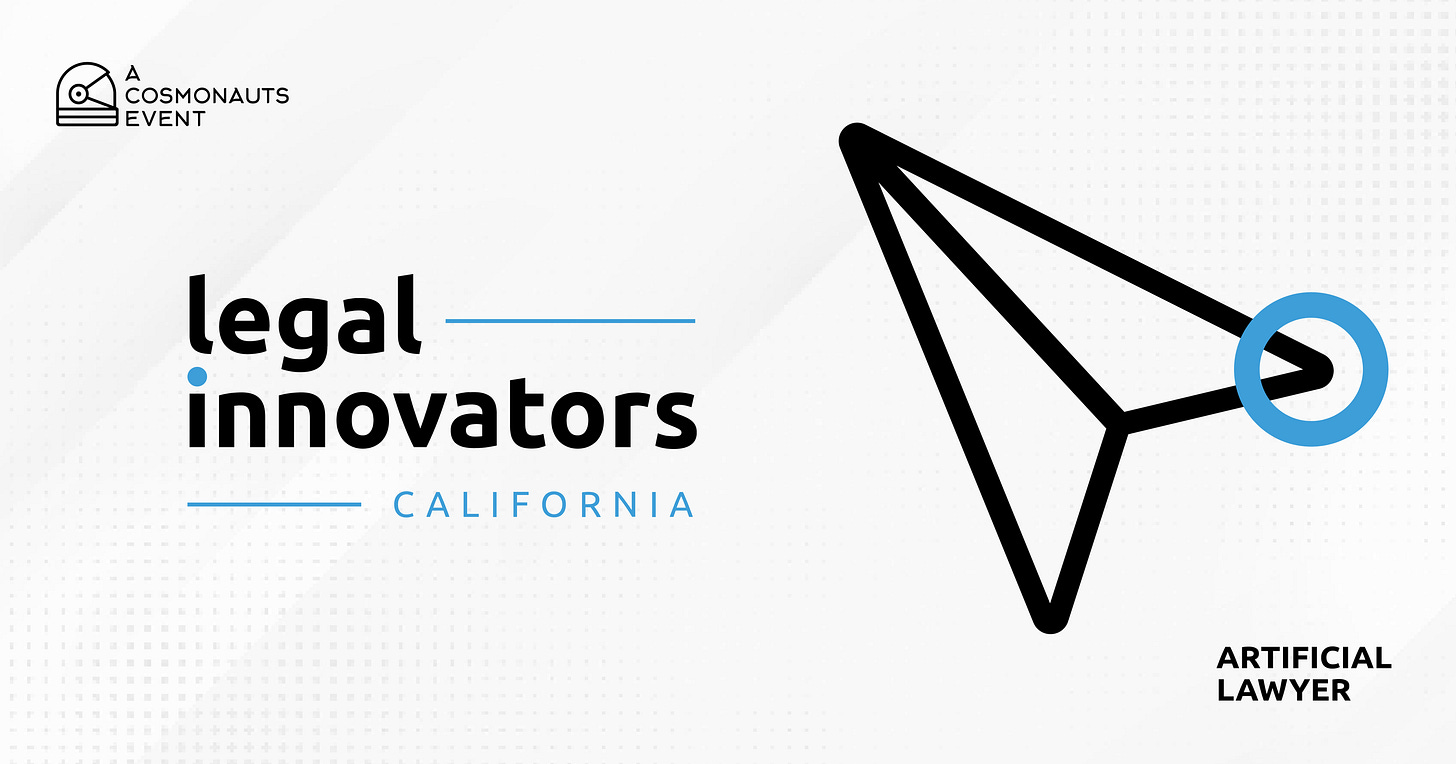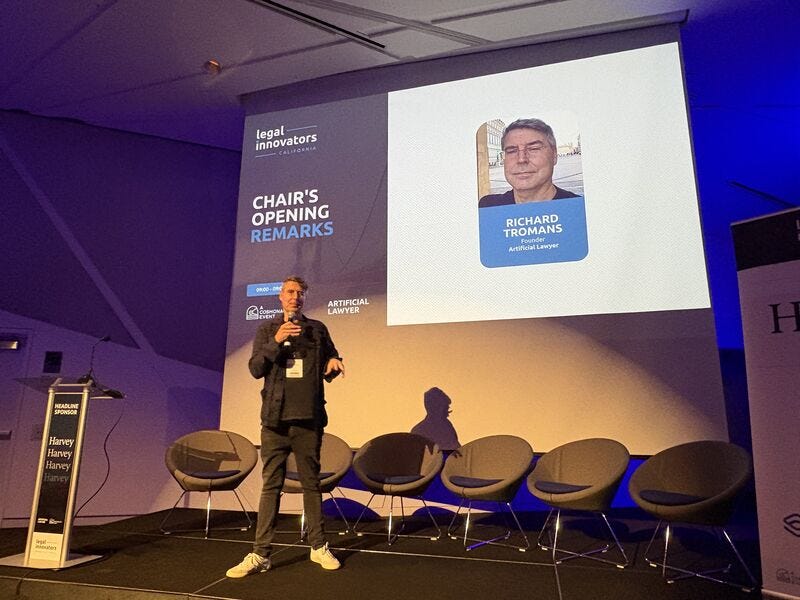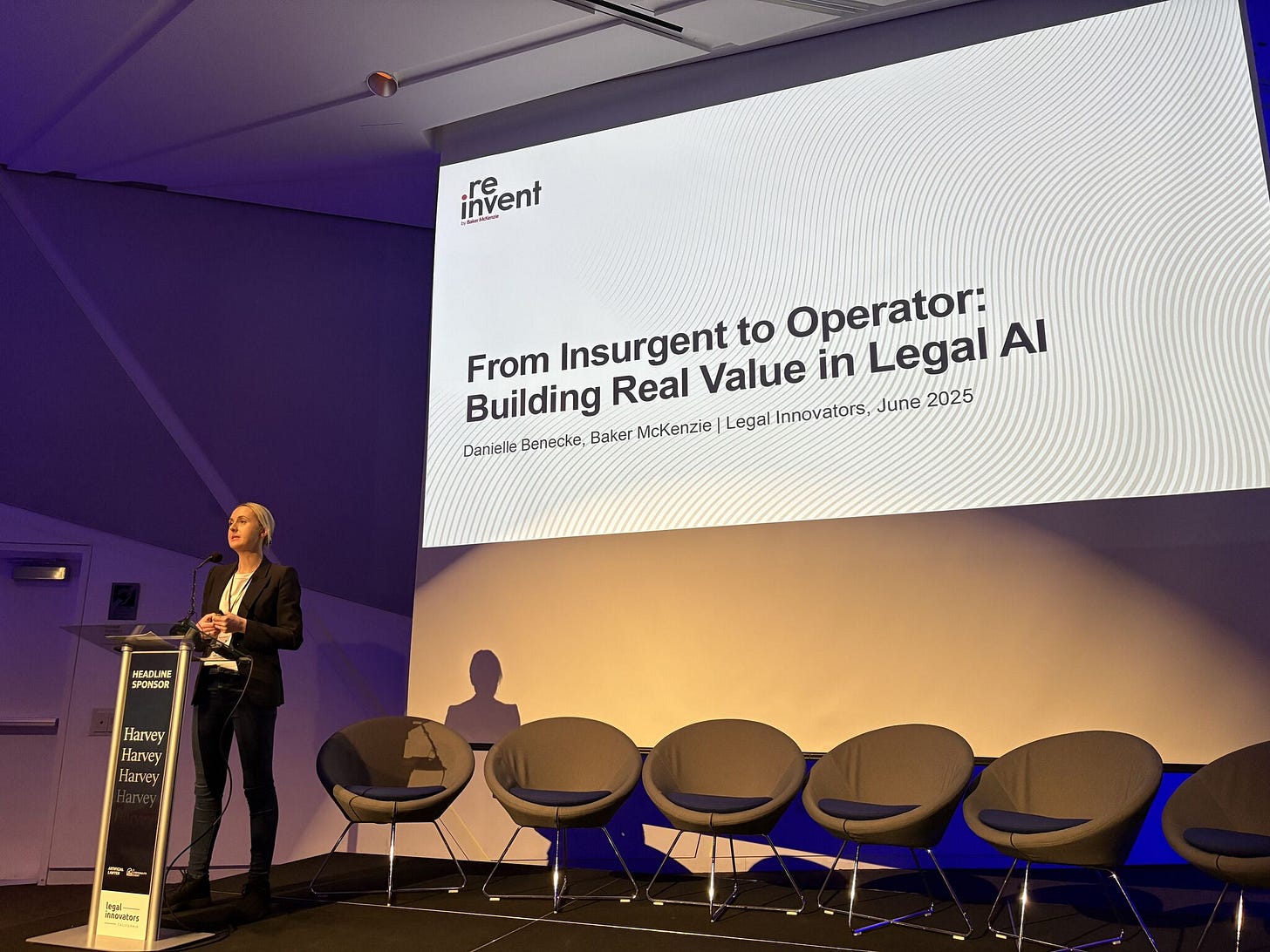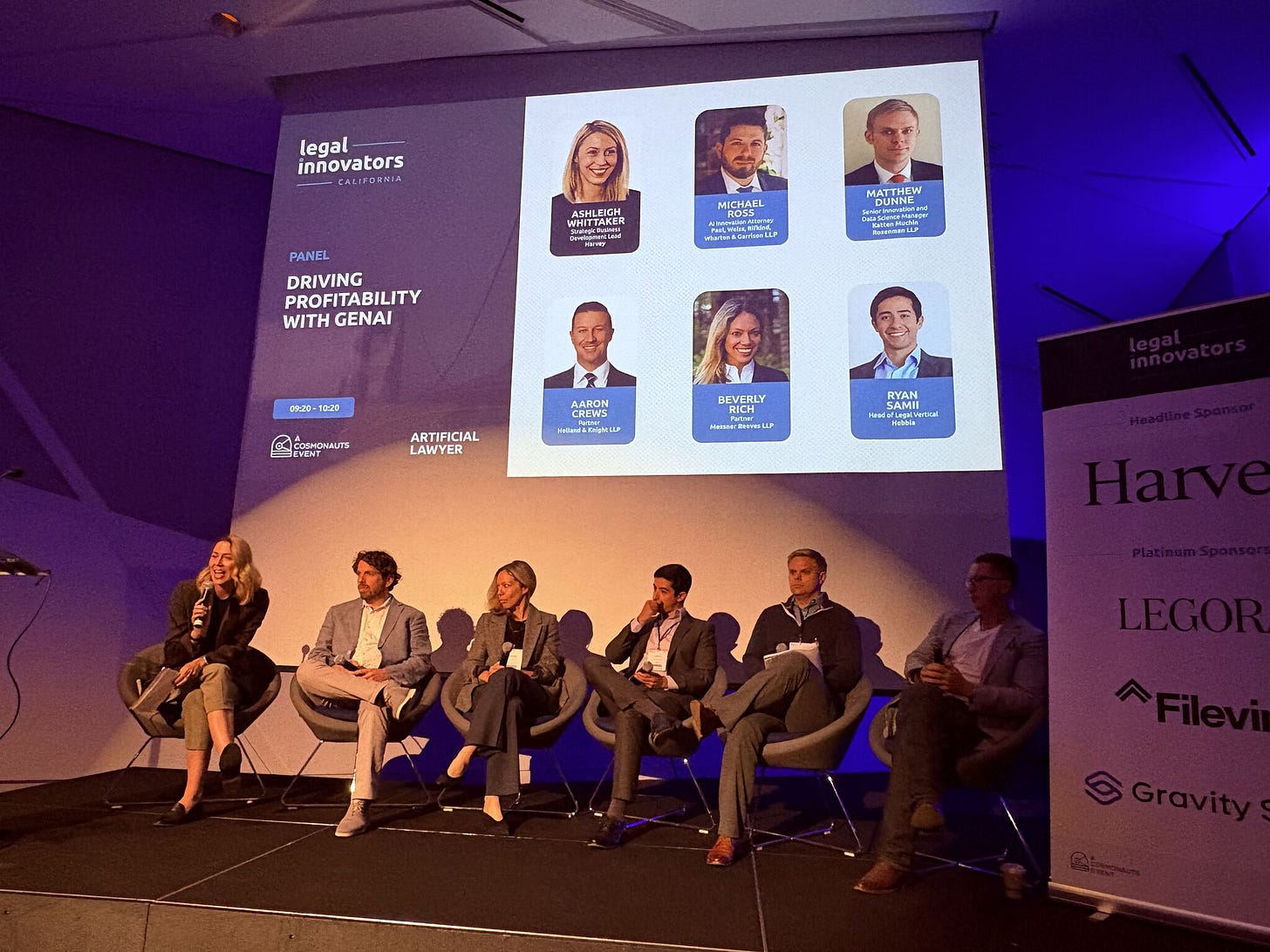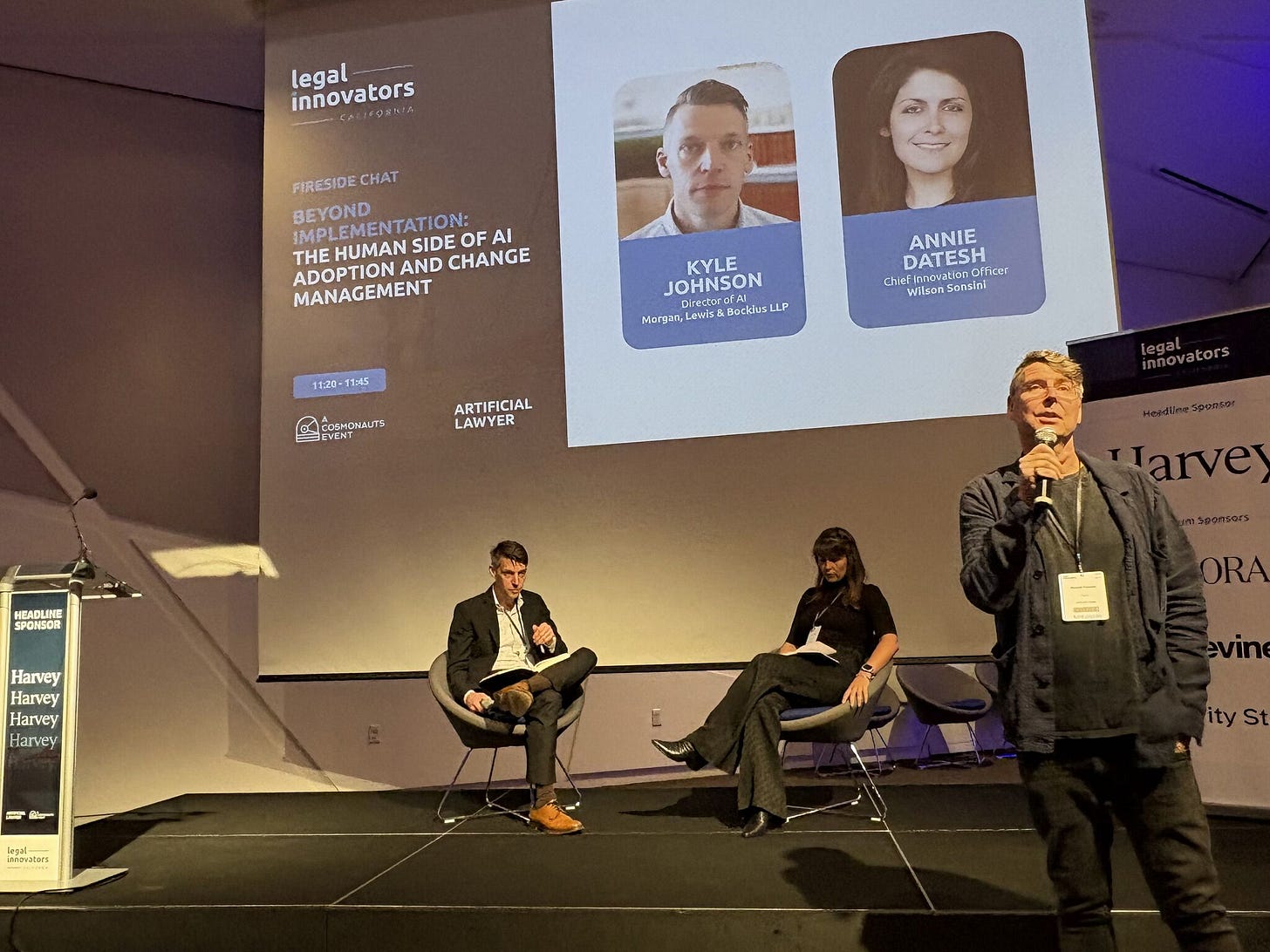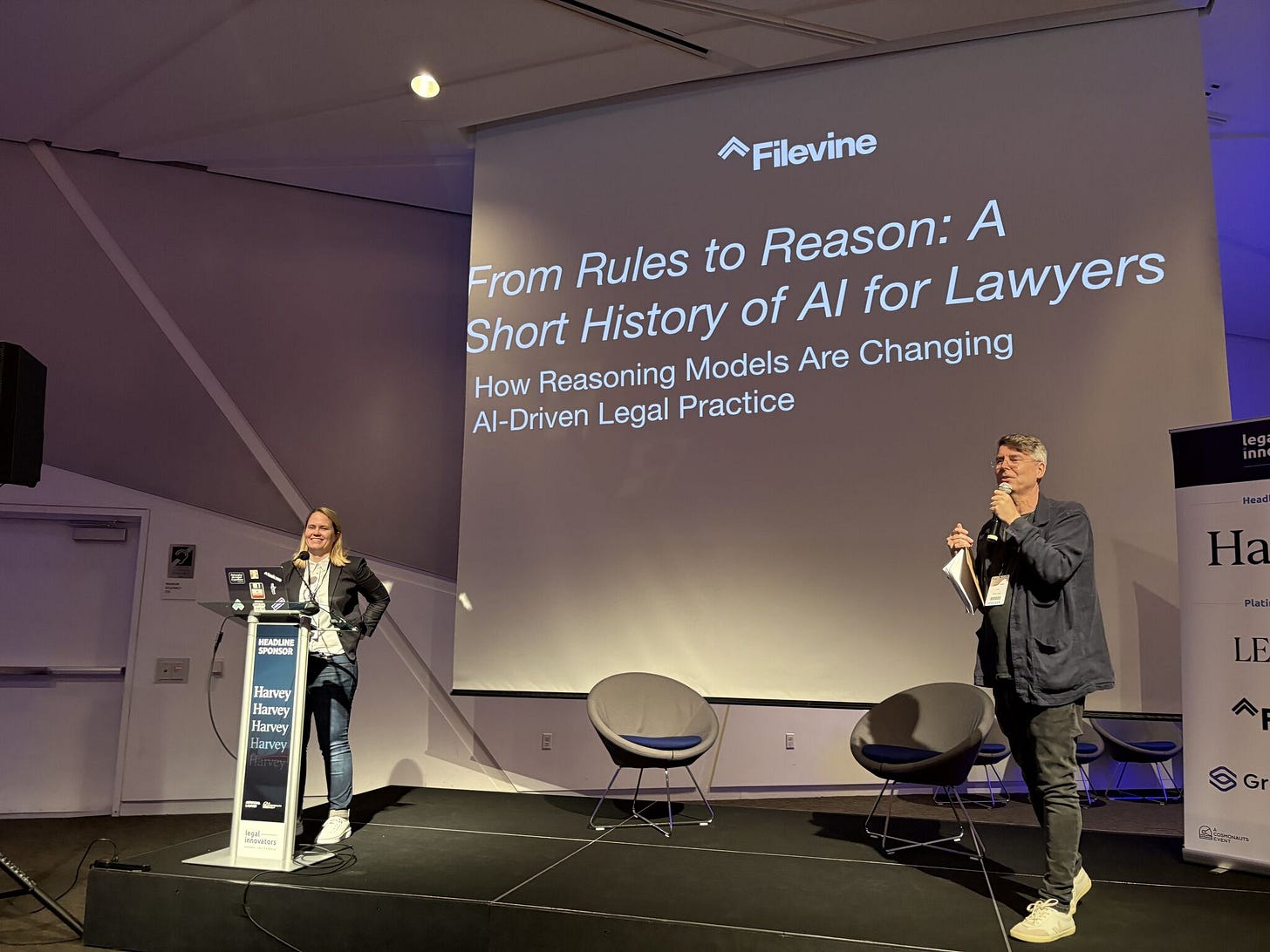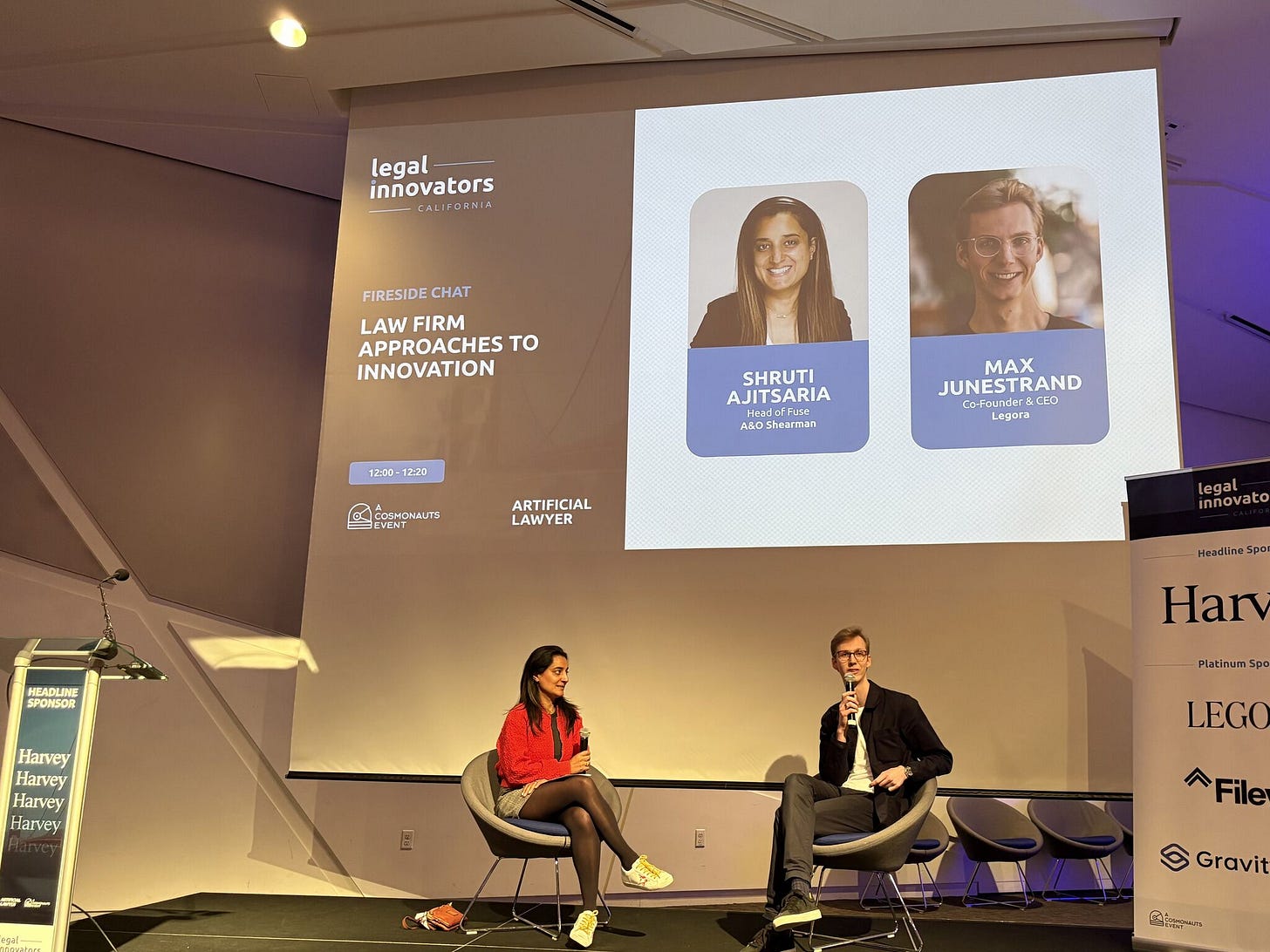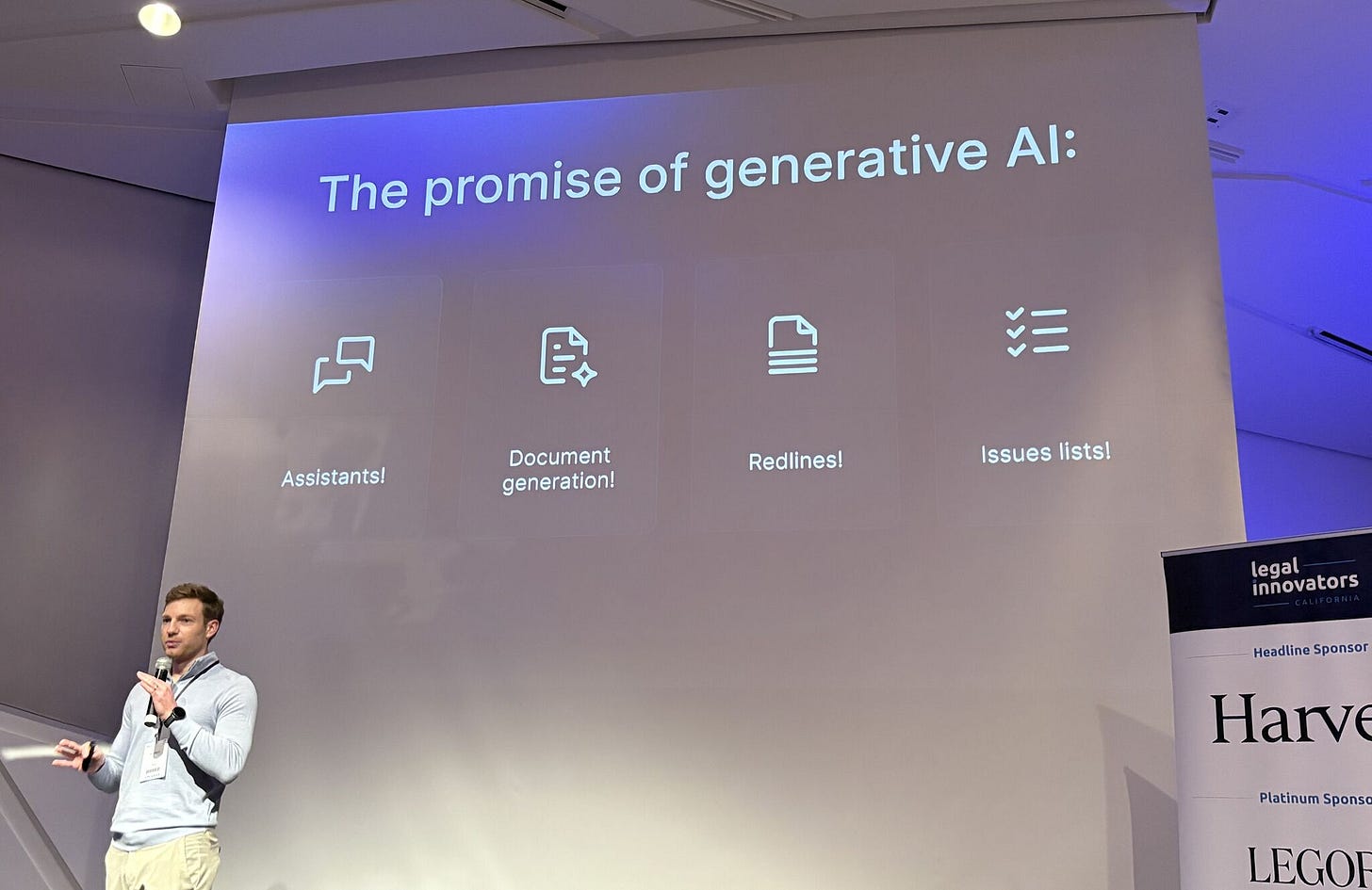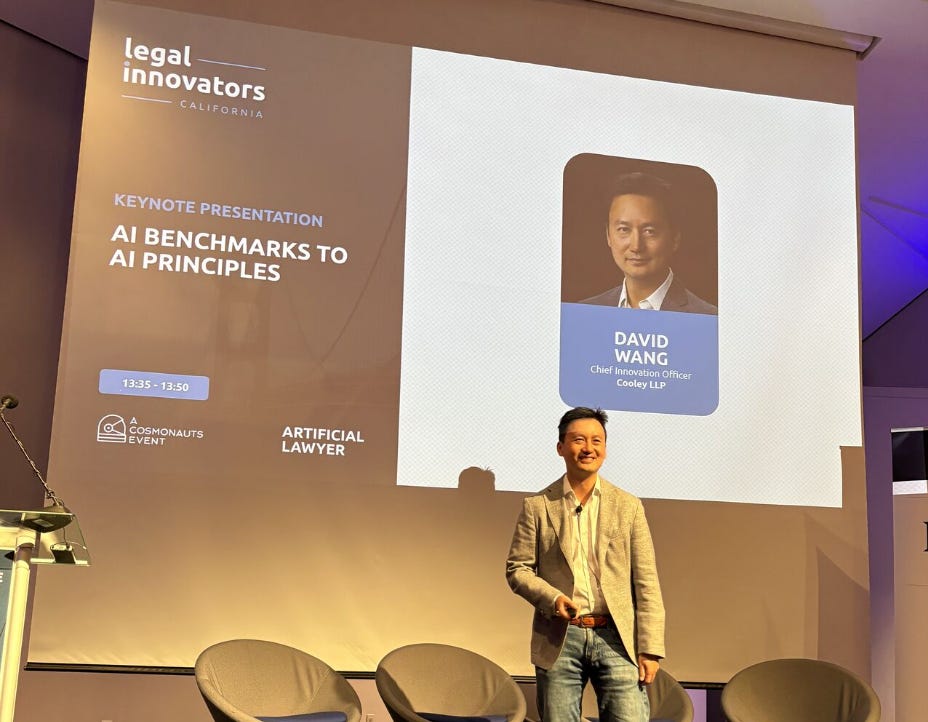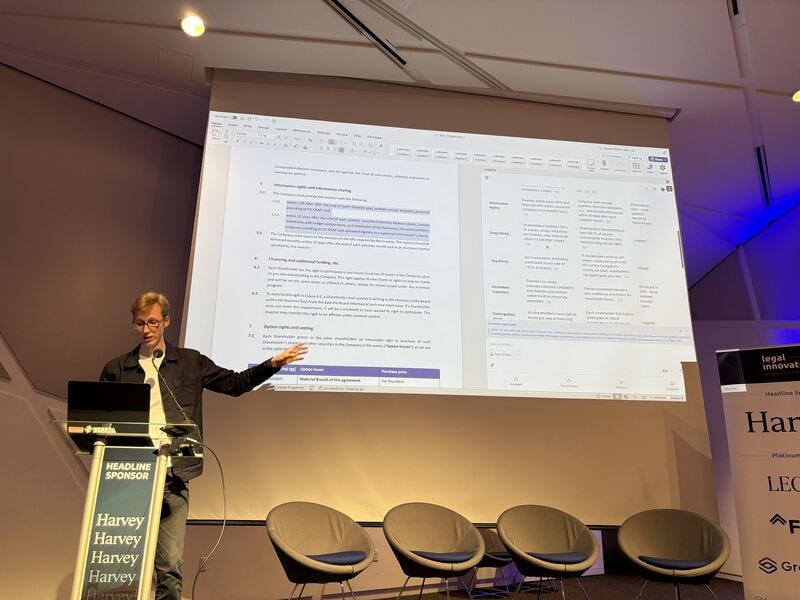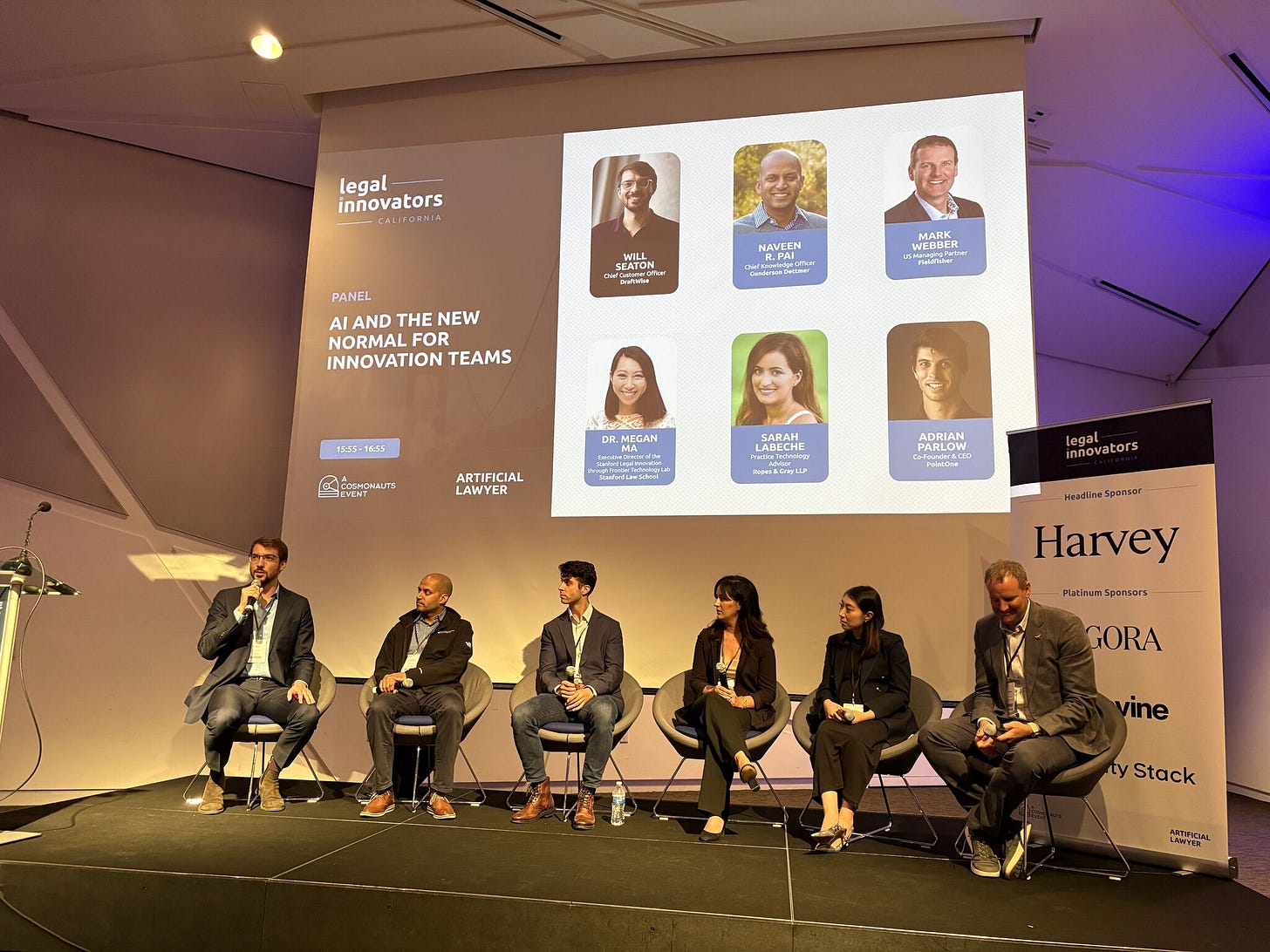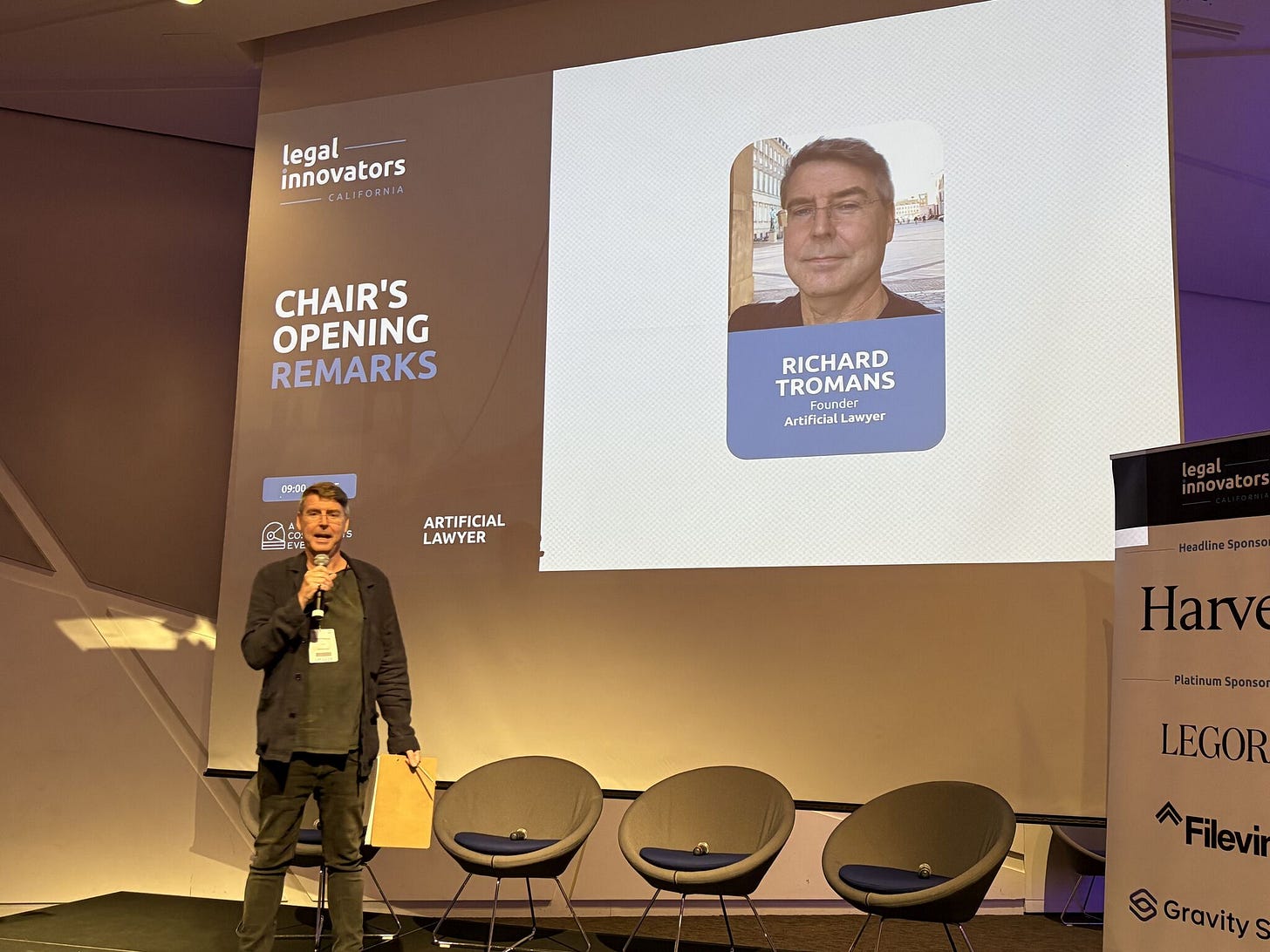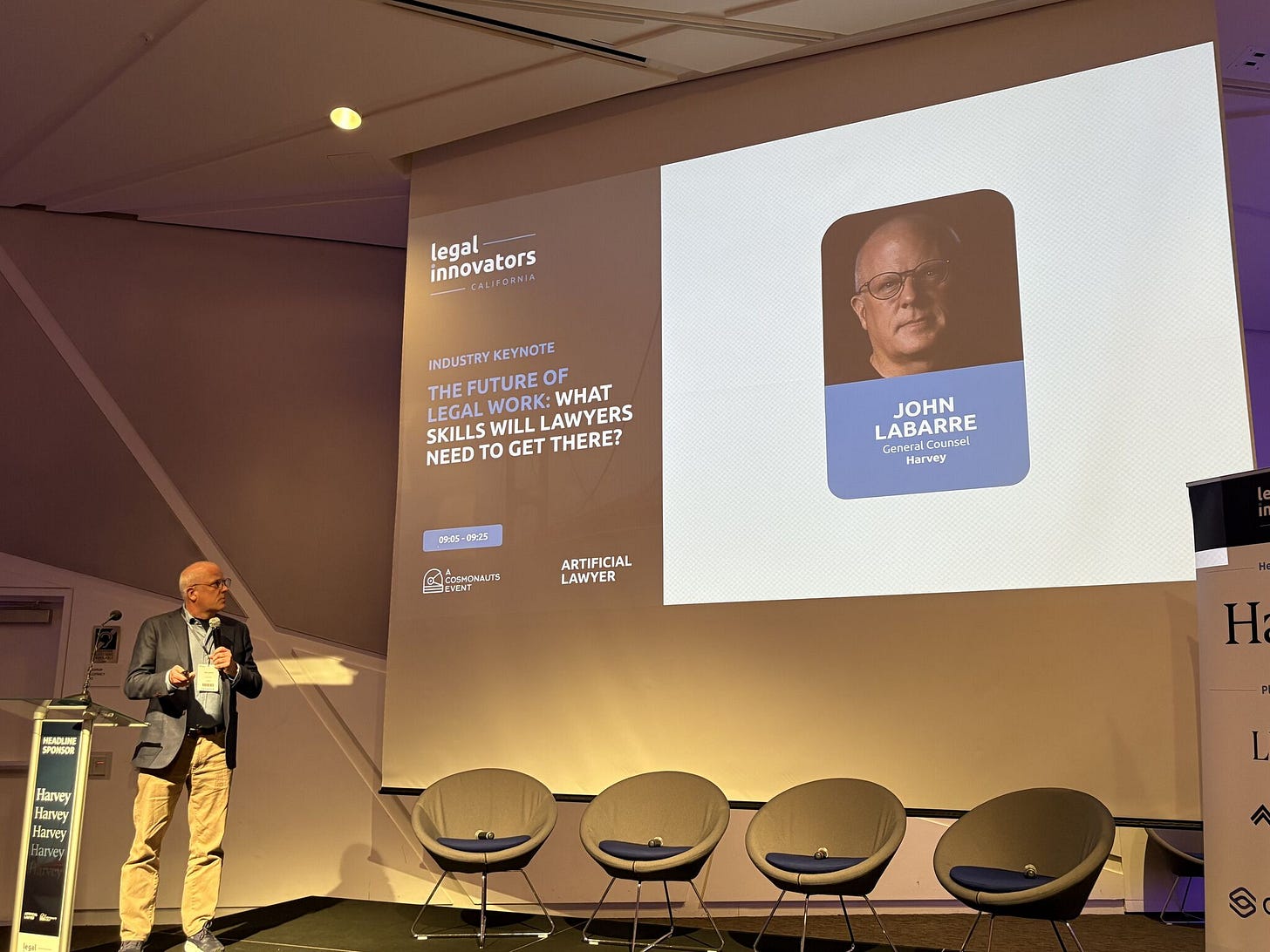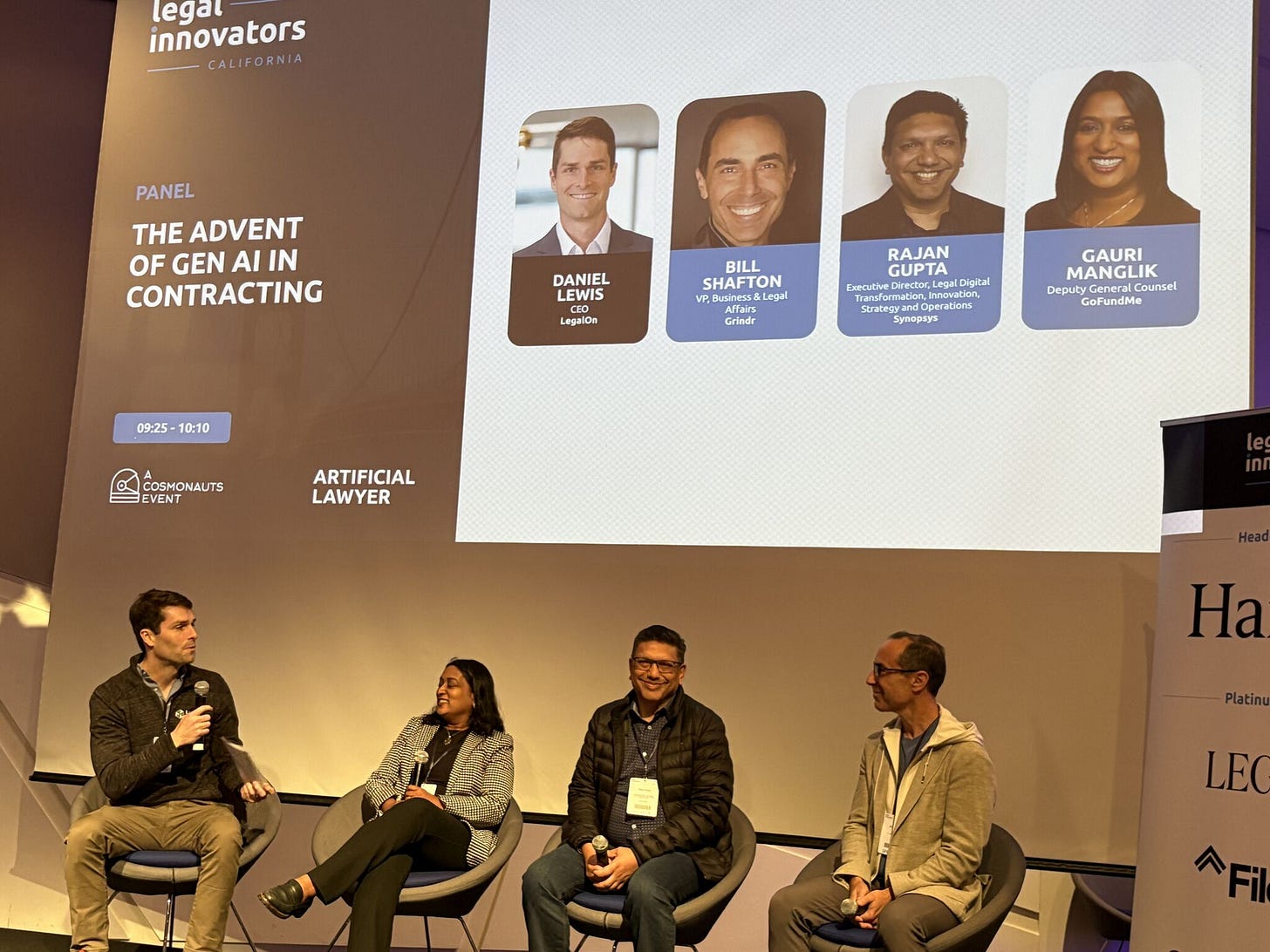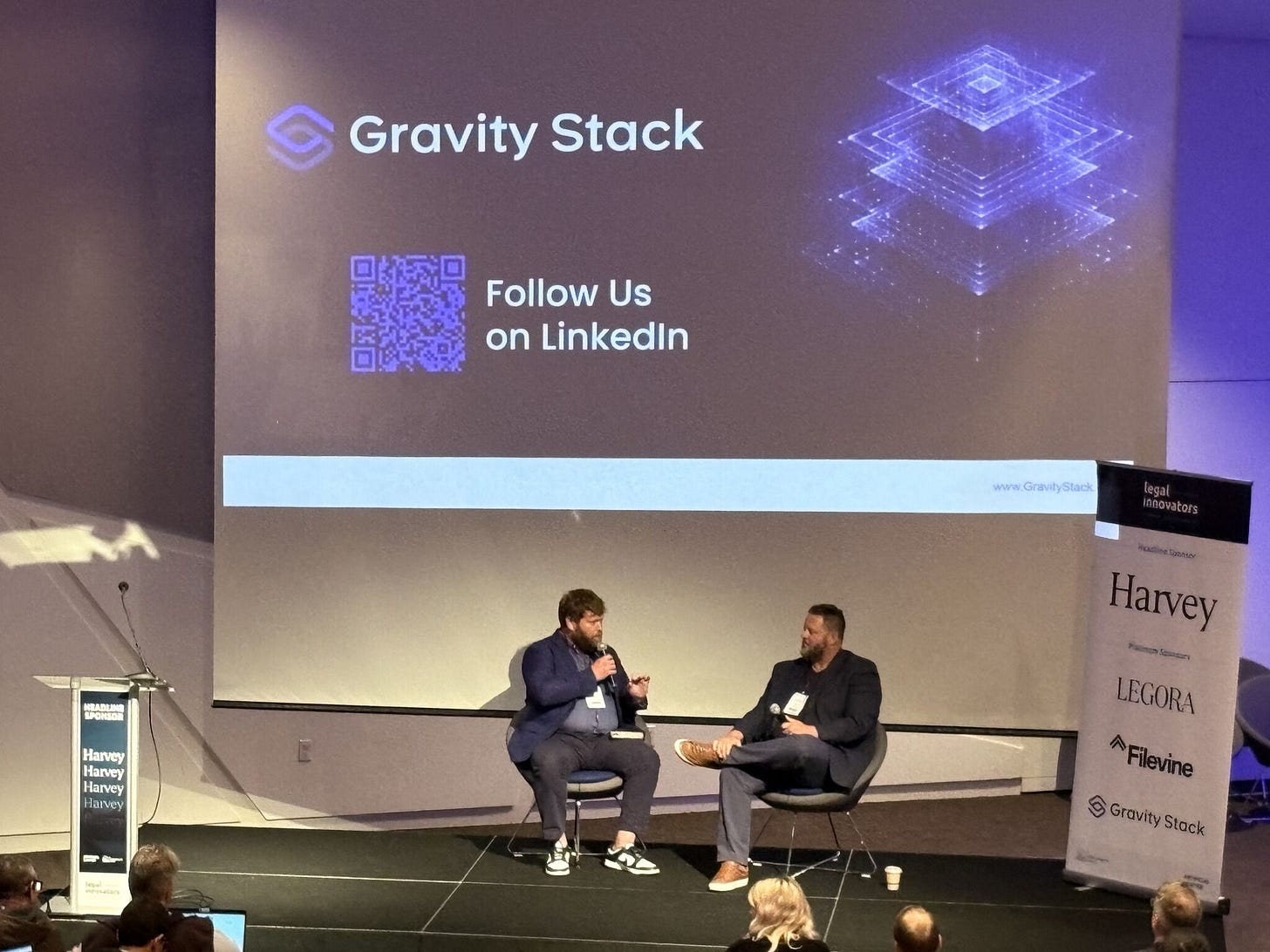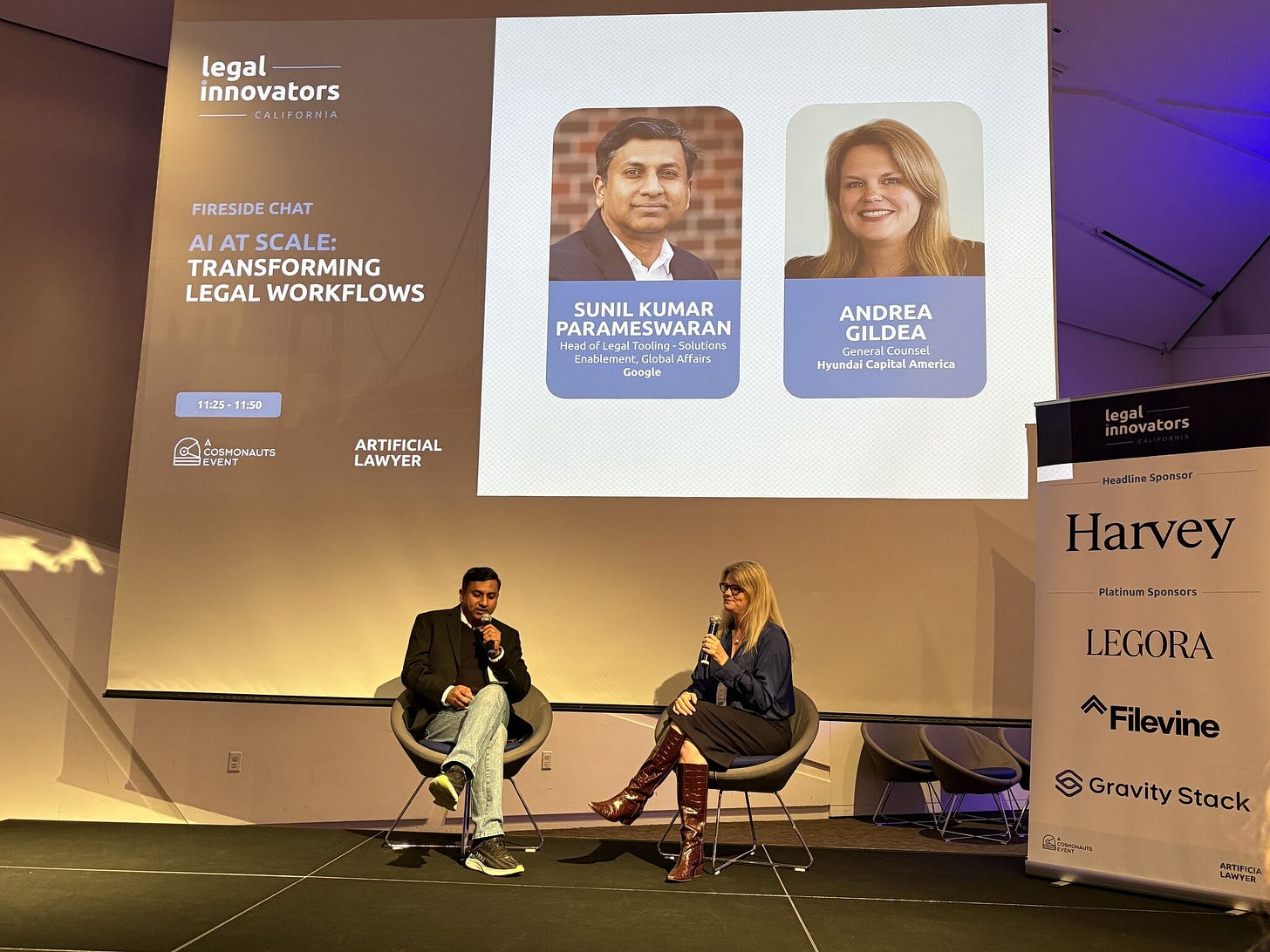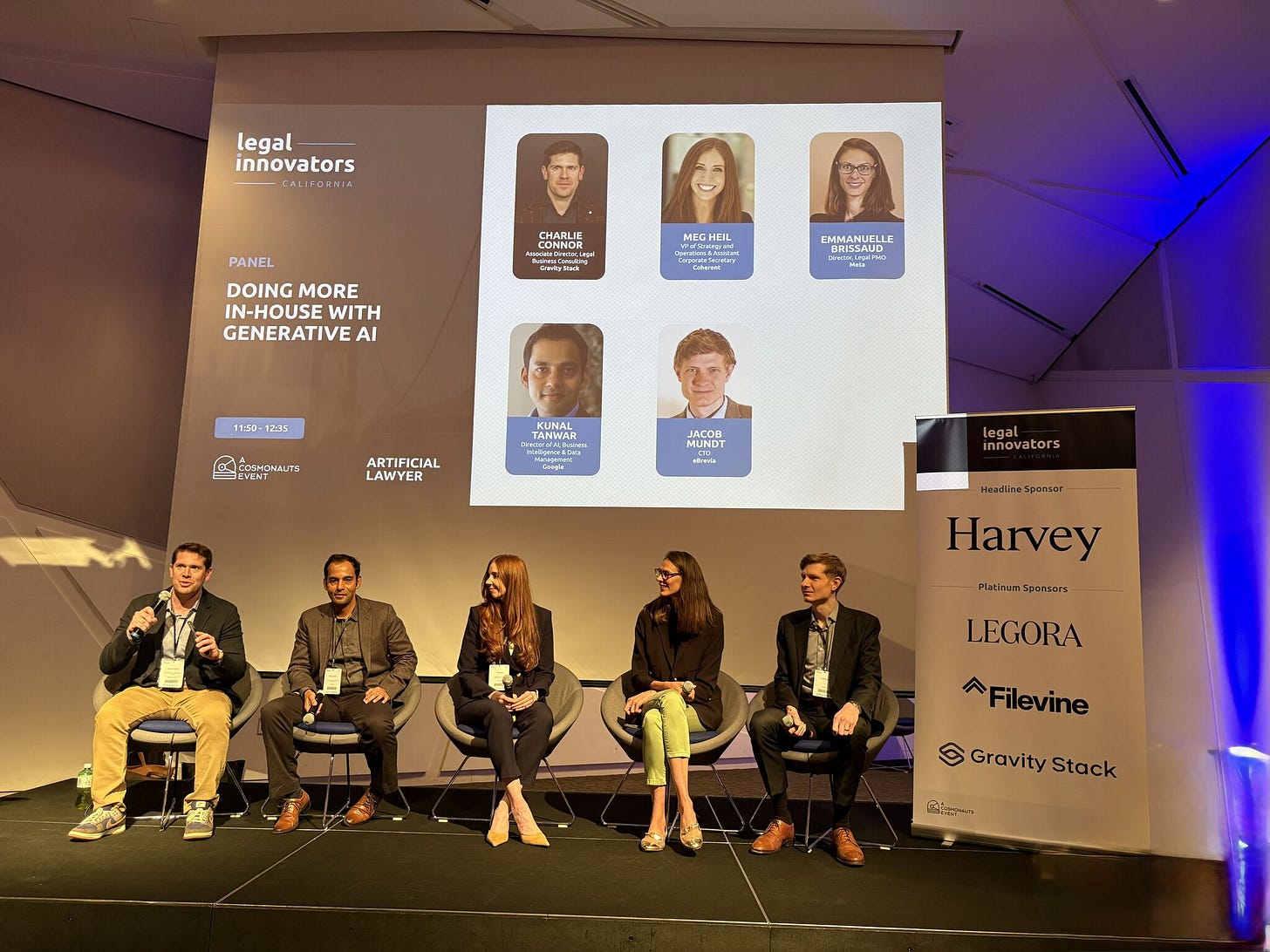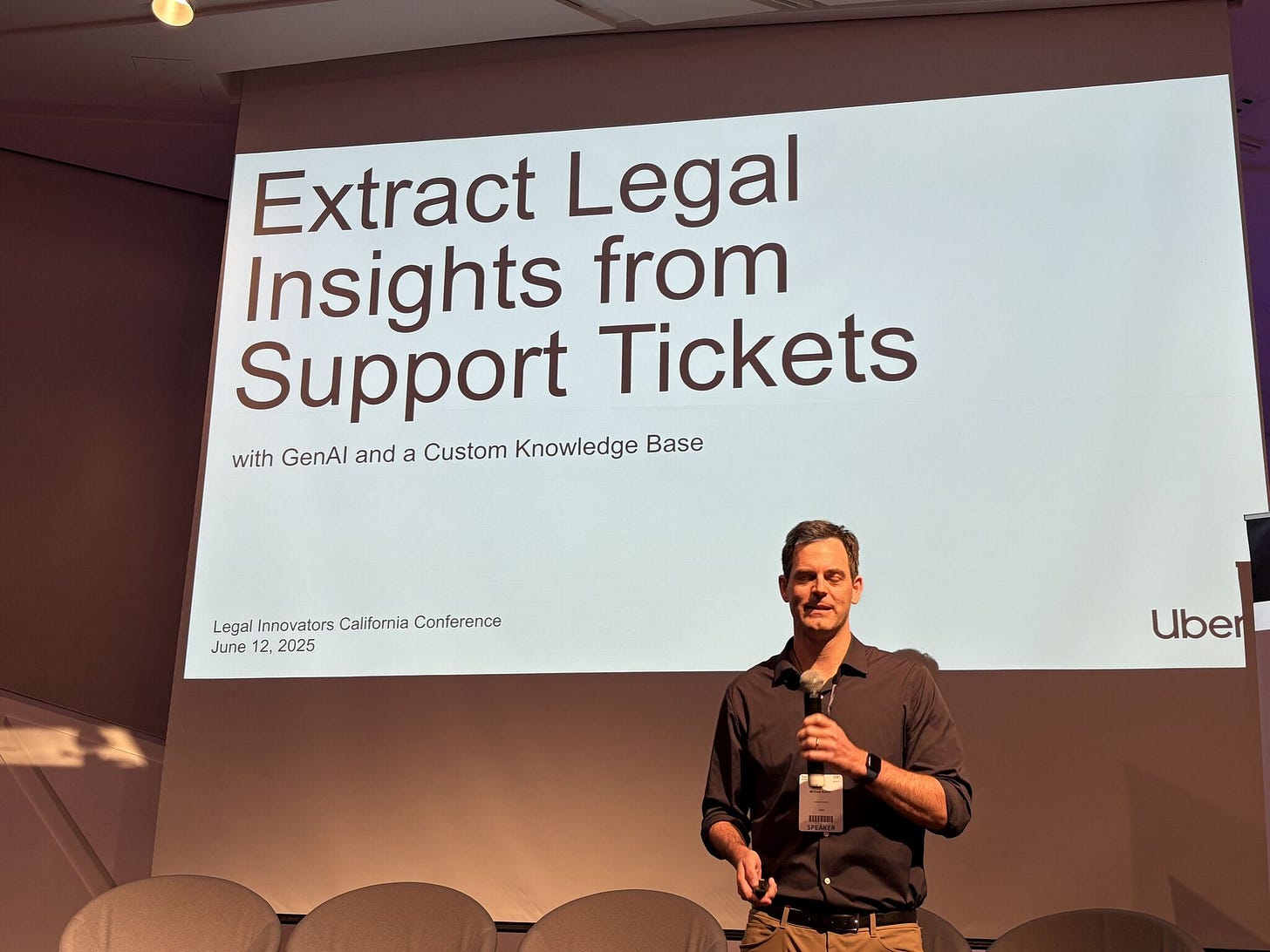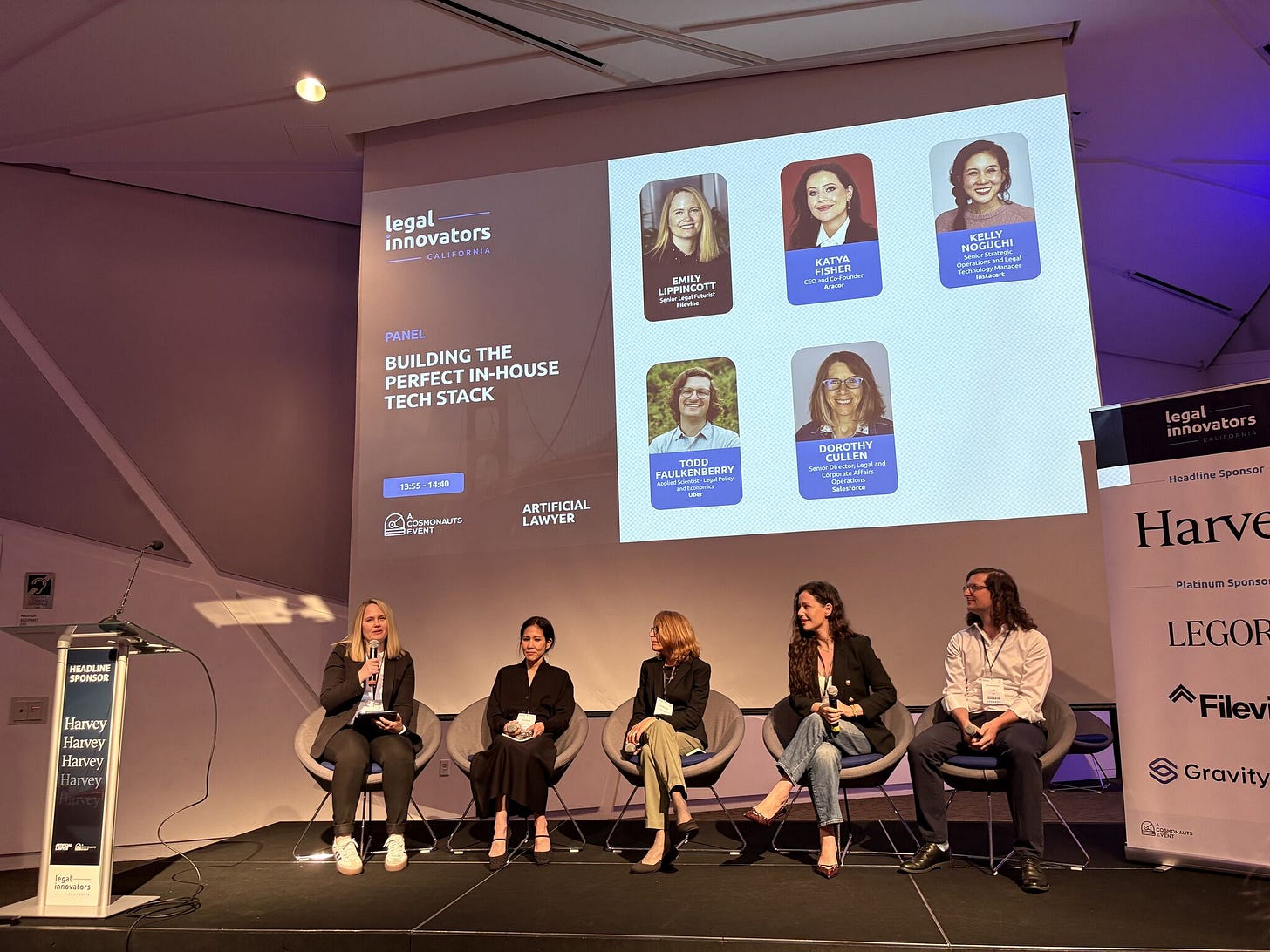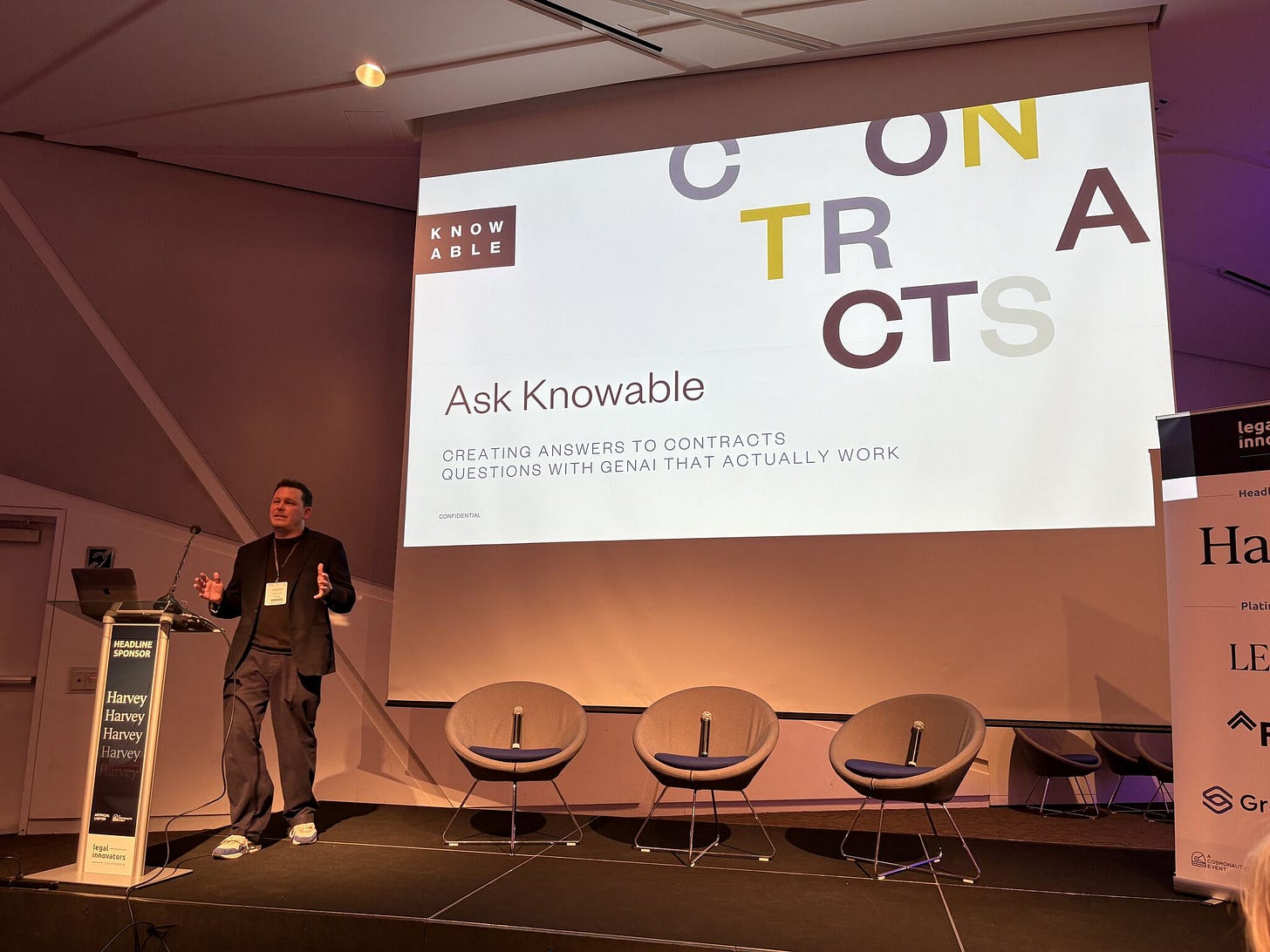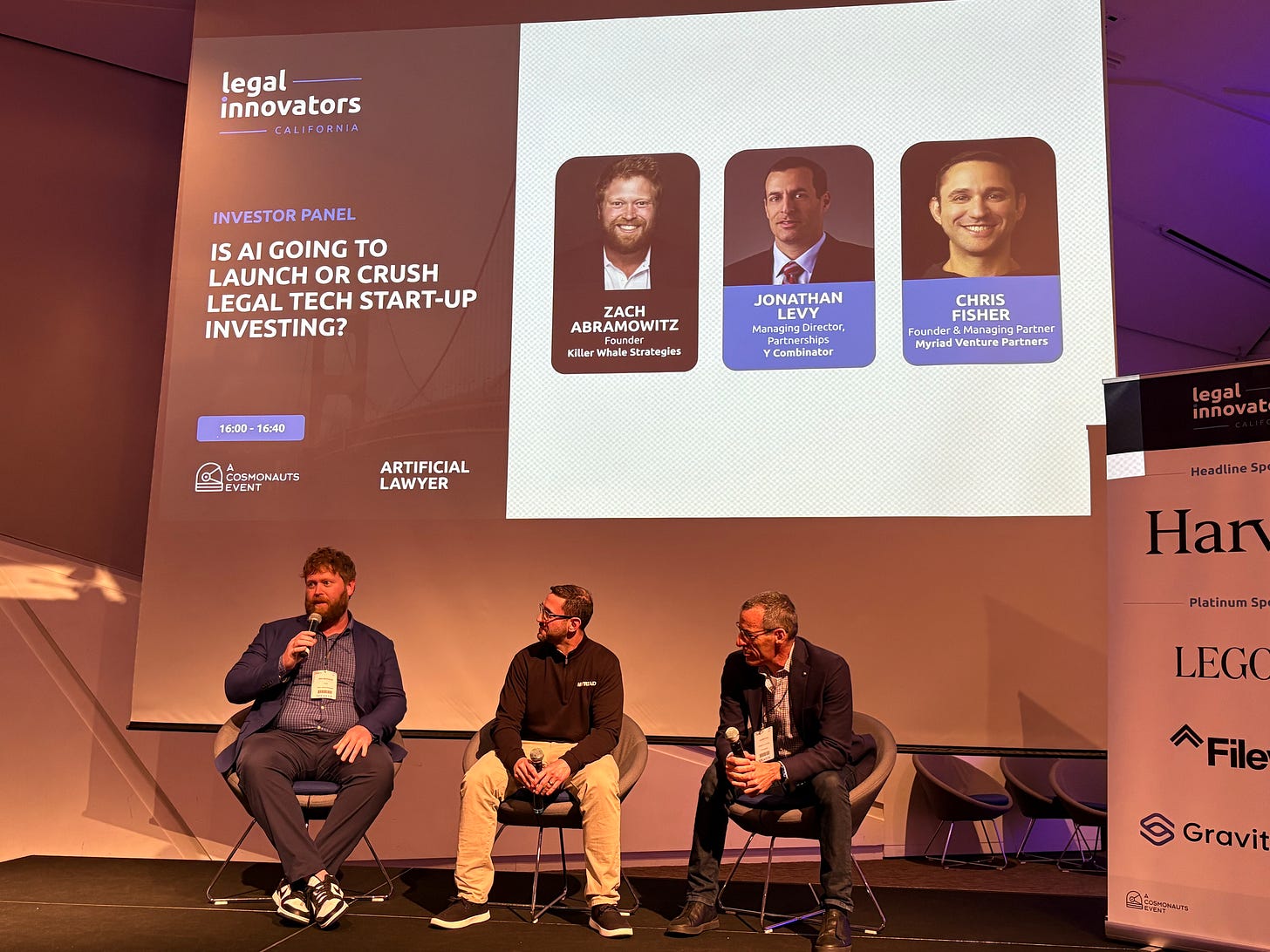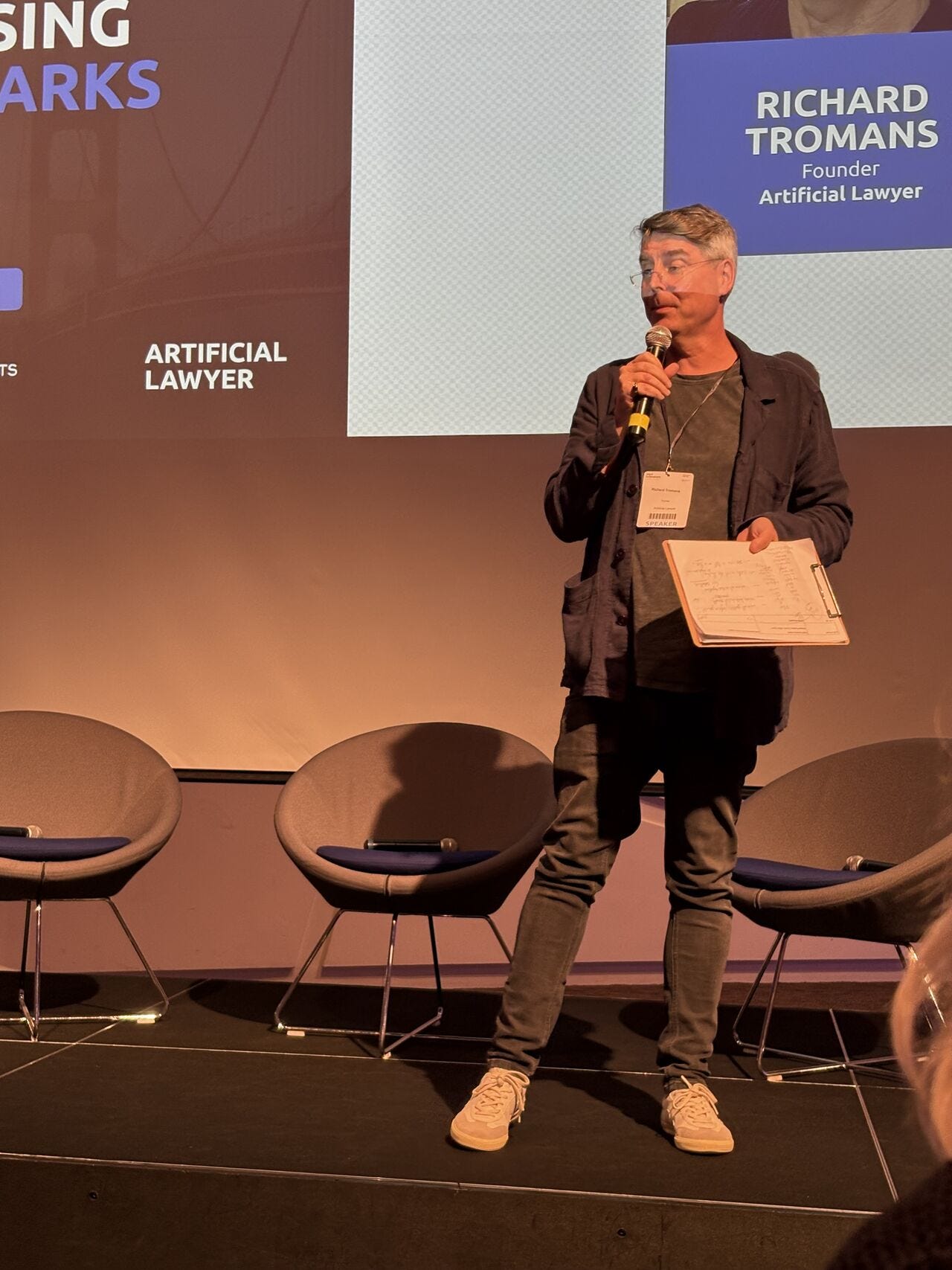Legal Innovators California 2025
Where I share my notes on a mind-expanding two day event, bringing together innovative minds and curious lawyers, in the city of the future
I was lucky to have a front seat at Richard Tromans’s and Cosmonauts’s well-attended and well-organized Legal Innovators California conference. If you’re somehow not familiar, Richard is the man behind Artificial Lawyer, the best source of Legal Tech & AI News and Views. Richard always puts on a good show and this year was no different: excellent speakers and appreciable value for all who attended.
Hosted in San Francisco over two days, the first day focuses on private practice attorneys and the second day on in house counsel, with the presentations and speakers uniquely tailored to each audience’s perspective and needs.
Richard’s events in London and San Francisco (and I have attended almost all of them) have been such a success, he is launching a new event in New York in November. So, if you live on the East Coast, I highly recommend you go because there’s a lot to learn and many brainy people to meet.
What follows are my notes and pictures from the conference for your enjoyment…
This substack, LawDroid Manifesto, is here to keep you in the loop about the intersection of AI and the law. Please share this article with your friends and colleagues and remember to tell me what you think in the comments below.
Day 1 - Private Practice
Richard Tromans opens up Legal Innovators California Day 1! “California feels like the future.” It certainly does! Packed crowd for private practice day.
Danielle Benecke opening keynote Legal Innovators California.
How is AI tackling layers of Judgment, Prediction, Labor, and Knowledge?
Most important question: Are we creating new client value?
Inputs —> Outcomes
What does AI empower?
Decision velocity
Risk mitigation
Shift toward productized and commoditized
Meanwhile application of AI to complex, high stakes work is also increasing.
Driving profitability with AI, first panel of the day at Legal Innovators California, chaired by Ashleigh Whittaker at Harvey, Michael Ross, Matthew Dunne, Aaron Crews, Beverly Rich Ingersoll and Ryan Samii.
Ross: Clients may be willing to pay more for the minute versus the week it might take for the same outcome.
Samii: Second order effects give more threads to pull on. AI unlocks details you never would have gotten to before.
Crews: Run the work business is ripe for commoditization. “It’s an arms race; bombers are great, but drones are better.”
Rich: in the short term, having AI will be a competitive advantage, but not over time - it is quickly become table stakes.
Beyond Implementation: Human Side of AI Adoption and Change Management fireside chat at Legal Innovators California with Annie Datesh and Kyle Johnson.
Datesh: She’s not going to bore everyone with tales about lawyers being stressed and the billable hour being a perverse incentive. It’s important to strike a balance of user enablement and training practically in use of tools.
Johnson: Get into psychology of lawyers. Vendors who stand out take the time to understand the firm for their particular needs. Not just demos and use cases, but the firm’s real needs.
From Rules to Reason: A Short History of Al for Lawyers How Reasoning Models Are Changing Al-Driven Legal Practice with Emily Lippincott at Legal Innovators California.
The practice of law will become more about the personal relationships than the work itself.
Humans need to be part of the process for discretion and judgment.
Lawyers don’t have time to dedicate to building their own tools.
Fireside Chat: Law Firms who use Approaches to Innovation with Max Junestrand and Shruti Ajitsaria at Legal Innovators California
Junestrand: If AI can do something, it will do those things. Law Firms who use AI will capture more market share. Prompt engineering is not as necessary anymore. Good incentives within law firms should be set to encourage AI education. Staying focused is key combined with high productivity development velocity.
Ajitsaria: Clients should be challenging their law firm more about how they are using AI specifically. What value is it creating?
Bringing Your Firm's Data to Life With Generative AI with Kevin Walker at Legal Innovators California
Using generative ai to organize, data
Data = your firms intellectual capital
Taking internal and external data and creating derivative data that is actionable and valuable.
Trapped data creates valuable intelligence for firms.
Keynote: AI Benchmarks to AI Principles with David Wang at Legal Innovators California
Cooley is a place that has principles.
In a moment like this, what do you hang on to?
Why is a lawyer not just a specialized consultant? What makes them different
Principles: Quality, service and trust.
Law firms want to move fast, but don’t break anything. This has to change.
Bring clients into the conversation early and have real conversations with them about what works.
Principles are empty words if you don’t put them into practice.
Meet Your New Collaborative Workspace
Max Junestrand of Legora at Legal Innovators California
As systems become more powerful, they integrate with other applications. We can make systems more transparent. We don’t really know where this is going to be in a year. It’s everybody’s duty to improve and to do the stuff that AI can’t do.
AI and the New Normal for Innovation Teams with Will Seaton, Naveen Pai, Mark Webber, Dr. Megan Ma, Sarah LaBeche and Adrian Parlow at Legal Innovators California.
Ma: Use agents to compliment personalities of partners. AI is excellent at role playing. Mistral is great for thorny negotiation. We need to rethink value creation for juniors when grunt work is being taken up by AI. Easier to get AI to be an expert, but harder for a human to use expressive language to get the output you’re looking for; the challenge will actually be to get AI to better prompt us to share our expertise.
Labeche: AI is like jello when first released. You need to show people how to make best use of it.
Pai: Consider not only automating the known with AI, but consider what you may have never dreamed of doing.
Focus on particular applications and the value it creates.
Webber: You need senior lawyers to deconstruct processes and rebuild them with AI systems.
Parlow: Co-build products through communication and collaboration
Day 2 - In House Counsel
Chair’s Opening: Richard Tromans kicks off Day 2 of Legal Innovators California. Richard gets us started with a energetic Good Morning!
Opening Keynote: THE FUTURE OF LEGAL WORK: WHAT SKILLS WILL LAWYERS NEED TO GET THERE? with John LaBarre, General Counsel, Harvey at Legal Innovators California
He warned us he has nothing profound, but does practical insight
With the command line, you needed to know the magic words, now you don’t with ChatGPT’s new command line
AI is really good at dealing with unstructured data
Collaborating with systems we’re starting to see a lot more of
Getting good at prompting is a skill you can develop
Panel: THE ADVENT OF GEN AI IN CONTRACTING with Daniel Lewis, Bill Shafton, Rajan Gupta, Gauri M. at Legal Innovators California
Lewis: Great use case for AI is application to contracts.
Manglik: Lawyers who use AI are going to beat out those who don’t. It can help avoid burnout. The more effective the legal team is, the faster the business can move. It’s interesting to think of legal department tool versus company wide tool. More custom tools are better. It can lead to strong, smaller, leaner teams.
Gupta: I use AI for everything and I’m a little concerned I may be losing critical thinking skills. Just kidding, but I use it a lot. With the explosion of tools, how do we choose?
Shafton: When I had CLM, I had 100+ steps I wanted it to undertake, so you have to adjust your expectations as to what AI can deliver.
Fireside Chat: LEANING INTO THE AI REVOLUTION ONE YEAR LATER with Zach Abramowitz, Bryon Bratcher at Legal Innovators California
Abramowitz: Maybe don’t use it yet to draft brief, but a great way to get through quarterly report. Has it saved you a night or weekend? Audience answers Yes. That’s why it’s getting viral.
Bratcher: Relate training, schedule training. Take a look at these documents, pull into table, draft a motion based on it. First draft will be done by AI.
Fireside Chat: AI AT SCALE: TRANSFORMING LEGAL WORKFLOWS with Andrea Gildea, Sunil Kumar Parameswaran at Legal Innovators California
Gildea: There’s people who will be reluctant and some looking ahead. It’s about getting the lawyers to do something better. You can’t be restrictive on AI — it’s like trying to tell people they can’t use the internet. Good prompting training is important. Lawyers are risk adverse, but nonetheless she’s seeing a shift with lawyers toward AI.
Parameswaran: This is an opportunity to look at a different way of doing things — you need not do everything as we’ve always done them. What is the ROI? How good are business processes defined? Data organized? Models change over time. Data grows over time. How much are you going to train your team over time. AI is embedded in Google’s culture so we use it everyday.
Panel: DOING MORE IN-HOUSE WITH GENERATIVE AI with Charlie Connor, Meg Cerullo Heil, Emmanuelle Brissaud, Kunal Tanwar, Jacob Mundt at Legal Innovators California
Tanwar: We pay for outcomes. AI helps to facilitate that. Data itself is the key. Information architecture is key. IA before AI.
Mundt: You know it’s a different world when a lawyer shows up with a fully implemented piece of software, then asks why you can’t incorporate it into your product immediately. Gate keeping is dead. Outside counsel needs to share tools, then you’re done. Set the terms of engagement with external counsel. Not the same old same old. Law firms should be sharing prompts like they do precedents.
Heil: Getting mindset shift so that failure is embraced as part of learning experience. It’s hard for people who are not used to failure.
Brissaud: we need to calibrate our messaging as to who the audience is we are talking to; that’s how we drive change, by meeting people where they’re at.
Keynote: EXTRACT LEGAL/COMPLIANCE INSIGHTS FROM SUPPORT TICKETS WITH GENAI AND A CUSTOM KNOWLEDGE BASE with Michael Kalish at Legal Innovators California
Iteration is key, be open to change. Unlock experimentation to have a golden database. Issues can be labeled and categorized. Work in parallel with each other by being on the same page about tags. Explore types of tickets, dataset moved to knowledge base, test how retrieval works, then fine-tune. Don’t add complexity where not needed. Try to get the most with the least. Don’t boil the ocean; focus.
Panel: BUILDING THE PERFECT IN-HOUSE
TECH STACK with Emily Lippincott, Katya Fisher, Kelly Noguchi, Todd Faulkenberry at Legal Innovators California
Cullen: If you don’t have GenAI in your product, you don’t have a product. Data is exposed and critical to be used. What is usage? You’re not alone. We’re in this together. That’s why we go to conferences like this.
Faulkenberry: we want everyone to use AI, but blank page is scary; we do a lot of trainings and documentation to make it easier to approach the tech. Have 100 page guide, also added that to NotebookLM and made it a living document that can provide answers. Use AI in your personal life to accelerate adoption.
Fisher: I’m trying to solve my own problems so I’m very specific in what I focus on. How do you judge quality in AI? Adoption is hard, even when you’re asking your employees to use your own product.
Noguchi: Adoption is most important. Even if it’s the best tool; without people using it, it’s hard to gauge success. Fit into place you’re already using. Focus on subtracting for your team, not adding to the complexity they have to deal with.
Standalone: GENAI ASK AND ANSWER: THE STRUCTURED DATA ADVANTAGE FOR CONTRACT ANALYSIS with Nicholas (Nik) Reed, CEO, Knowable at Legal Innovators California
Contracts often turn chaotic, especially with rogue early generation AI-generated termination letters. Contracts are complex, interconnected documents and require nuanced legal logic and GenAI systems. Structured family mapping clarifies document status instantly, shrinking weeks of manual tasks to moments, and sharply cutting costs.
IS AI GOING TO LAUNCH OR CRUSH LEGAL TECH START-UP INVESTING? with Zach Abramowitz, Jonathan Levy and Chris Fisher at Legal Innovators California
Inbound interest booming: Every deal now inbound; clients actively searching for expertise in legal-tech. Web traffic skyrocketing, probably 5x growth.
Talent bar significantly higher: Past success just required being slightly innovative over old incumbents; today, startups need “A-plus, generational talent” to compete.
Legal AI not a two-horse race: Despite Harvey and similar prominent names dominating headlines, market still fragmented, specialized solutions likely necessary, no clear winner yet.
Ideal customer uncertain: Perfect AI customer (forward-thinking, AI-first law firm) doesn’t fully exist yet, firms still evolving; adoption varies widely by firm size and practice area.
Shifts in VC approach possible: Traditional VC model might shift as AI companies bootstrap successfully, lean startups potentially better positioned without external funding pressures.
Training gap critical: AI impacting traditional law firm training/apprenticeship model; urgent need for innovative solutions to effectively train junior attorneys in the AI-driven future.
Richard Tromans closes up Day 2 of Legal Innovators California
Winner for today’s takeaway: “We’re all getting high in the backroom with GenAI.”
“With Generative AI we’re still early.”
“Move fast build small build ROI.”
“You’re not alone we’re all in this together.”
Richard: “We’re literally building the future of legaltech in this room together.”
See you at Legal Innovators New York!



